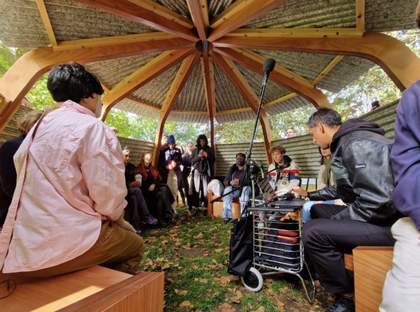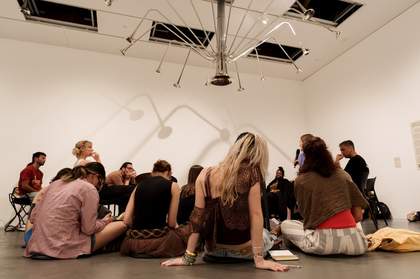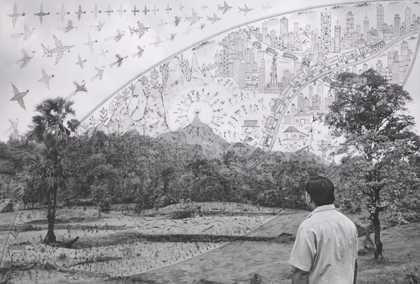Abbas Zahedi (b. 1984, London, UK) is an artist with a background in medicine from University College London and an MA in Contemporary Photography and Philosophy from Central Saint Martins. His practice engages with systems of care, thresholds of experience, and the creation of communal spaces for dialogue. Zahedi’s work often weaves together personal narratives and broader collective concerns, using sound and materiality as conduits for reflection and connection. He has been the recipient of numerous awards, including the Stanley Picker Fellowship (2024); Artangel: Making Time (2023); Frieze Artist Award (2022); Paul Hamlyn Foundation Award (2021); Serpentine Galleries’ Support Structures for Support Structures (2021); Artangel: Thinking Time (2020); Jerwood Arts Bursary (2019); Aziz Foundation Scholarship (2018); and the Khadijah Saye Memorial Scholarship (2017). Zahedi is an Associate Lecturer at the Royal College of Art, London, and has taught at universities across the UK and internationally.
Glen Tarman is a founding member of Liberate Tate, an art collective set up in 2010 to explore the role of creative intervention in social change and to 'free art from oil' in a time of climate change. For six years he played a leading part in the internationally renowned group’s ground-breaking performance art and actions focused on Tate ending its BP sponsorship. In 2016 Liberate Tate won their campaign with the gallery cutting its ties with the oil company and going on in 2017 to declare a climate emergency. Glen then worked with the Cuban artist Tania Bruguera at Tate on making art and performances that are part of social change and using the museum as a forum for public debate. He remains a member of Tate Neighbours, the body advising the art museum on its action and relationships with the local communities around Tate Modern so that it better meets their needs. Glen has over 30 years’ experience of campaigning and activism on social justice, environmental and climate issues heading up advocacy with the world’s leading international NGOs, including co-founding Make Poverty History, one of the biggest campaigns Britain has seen. He is presently leading the collective campaigning of UK charities to better protect the health of people and the planet by changing our broken food system.
Hannah Davey is an artist and activist, realising special projects that activate and challenge public, corporate and political spaces – usually without permission. Hannah has been the inhouse art and activism specialist at Greenpeace UK since 2008. She’s currently embedded in the climate justice team working in collaboration with colleagues in the Philippines on the impacts of extreme weather caused by big oil. Previously, Hannah ran Greenpeace UK’s food justice art/activism program: Bad Taste which began with an open call for artists to devise interventions into the industrial food system. Bad Taste was co-led with Mary Jane Edwards and Sandra Ata and hosted Harun Morrison as artist in residence, with open call support from Tania Bruguera and Larry Achiampong. Outside of Greenpeace she is part of Liberate Tate, a guest lecturer with The Dutch Arts Institute and also sits on Transnational Ecological Grief Council: Foreshadowing, founded by Youngsook Choi, which will be launched in May this year. Hannah has lived off-grid for over a decade between a semi-ancient Sussex woodland and on a narrowboat on London’s River Lea. Her practice engages here with regenerative systems, fungi, water, woodland, foraging, ritual and magic. This arboreally-engaged work is rooted in nourishing her wider socially-engaged art/activism.
Sally Davies trained as a psychiatrist and psychotherapist and worked for 20 years in the NHS, leaving in 2017 to pursue her interest in clowning and poetry. Sally is interested in the therapeutic potential of play and created Queer Family Cabaret, a workshop for families to play together using costume and clown. She has also curated workshops exploring surrealism and clown as a means to connect more deeply with nature. Sally currently uses clown and tarot to create connection and community, devising tarot decks which use the historical characters and psycho-geography of London to celebrate diverse groups. These decks, written as poems, become psycho-magic art-brut objects, created in community, as well as immersive embodied tarot performances (devised with the ecological clown collective Divine Ridiculous). Sally’s most recent deck, The London Clown Tarot was made for The London Clown Festival and used a cast of 22 contemporary London Clowns. She is currently working on her fifth deck within this series for and is returning to train as a psychotherapist using Breathwork.



